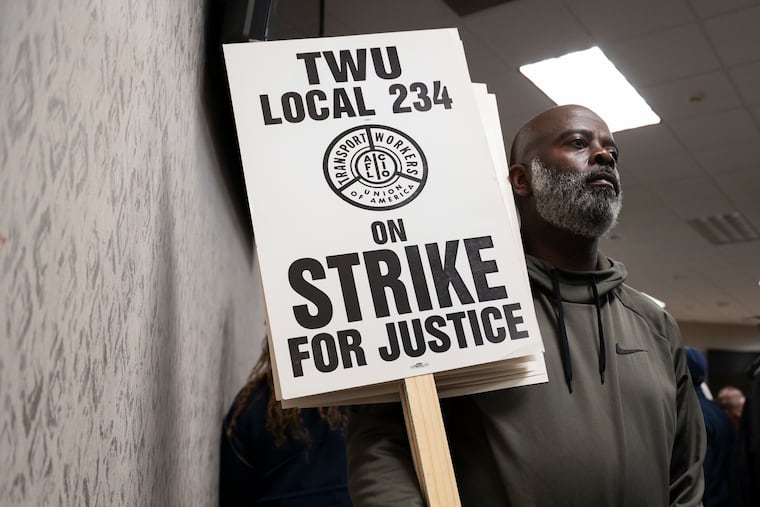Transport Workers Union ratified a new one-year contract with SEPTA
Contract negotiations took place as SEPTA was in a fiscal crisis.

Transport Workers Union Local 234, SEPTA’s largest labor union, has ratified a one-year tentative contract agreement with the regional transit agency.
TWU members will get a 5% across-the-board wage increase, as well as a 5% monthly boost in pension benefits for members who retire during the next year.
“The contract we just ratified will put more money in our members’ pockets and will improve safety and security for workers and passengers,” TWU Local 234 president Brian Pollitt, who began his career as a bus operator, said Friday.
The union and SEPTA had reached the tentative agreement on Nov. 20, two days before the city announced it had reached a similar one-year deal with the 8,400-member American Federation of State, County, and Municipal Employees District Council 33, which also called for 5% raises. At one point the SEPTA and city union had considered a coordinated strike.
The city union contract would expire at 11:59 p.m. June 30, and the TWU’s at 11:59 p.m. Nov. 7.
SEPTA also agreed to improve personal safety for employees in light of attacks on frontline transit workers, including bulletproof enclosures on buses to protect operators, upgrades to radios, and fixes to allow uninterrupted communication in subway and trolley tunnels.
“I want to emphasize that we only reached a one-year agreement. In 2025 we will be back at the bargaining table and in the new year we also will be seeking greater support from Harrisburg for public transportation,” Pollitt said in a statement.
SEPTA’s board is scheduled to vote on the contract later this month.
TWU and SEPTA began an intense round of bargaining Nov. 8 after the current contract expired. Local 234 members had authorized a strike and have been working without a contract. Union leaders held off on the walkout and kept talking.
“I was pretty close” to calling a strike, Pollitt said after the tentative deal was reached on Nov. 20, calling the negotiations “tedious.” Scott Sauer, who is now SEPTA’s interim general manager, noted at the time that the transit agency’s “unprecedented” fiscal crisis made talks especially difficult.
SEPTA initially offered no wage increase and at one point proposed that TWU members pay more for their health-care coverage. Pollitt said both were unacceptable to the union, though it did agree early on to aim for a one-year deal, given the circumstances.
With roughly 5,000 members, Local 234 represents bus, subway, and trolley operators, mechanics, cashiers, maintenance people, and custodians — those who keep the city moving. A strike would have shut down public transit within Philadelphia city limits.
TWU’s City Transportation Division employees approved the contract 1,172-365, the union said. The suburban TWU bargaining unit for Frontier Division workers voted 93-15 in favor. And the unit representing suburban mechanics approved the contract 69-11, TWU said.
The agency has a $153 million operating deficit, whittled down from $240 million before a $46 million one-time payment from the state and the use of reserve funds to plug the gap. The crisis developed as SEPTA’s share of federal pandemic relief for the nation’s transit systems ran out earlier this year amid sharp increases in costs.
Gov. Josh Shapiro, a Democrat, on Nov. 22 announced he was ordering the flexing of $153 million of federal funds for state interstate construction projects to SEPTA, a legal maneuver that has rarely been used to such an extent in Pennsylvania.
This story has been updated to properly identify the TWU units that voted.